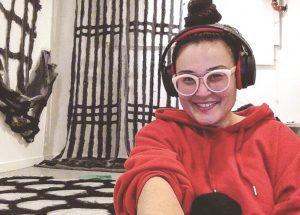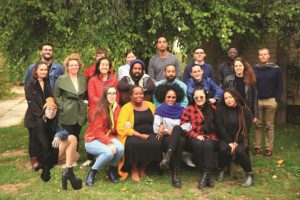PROVINCETOWN — Last year’s Fine Arts Work Center (FAWC) resident fellows accused the nonprofit that hosted them of racism. Then the pandemic hit, and several of those fellows had nowhere to go when their residencies were over.
The center’s board and management agreed to let five of the fellows stay an extra month and a half in FAWC housing, until June 15, while they found other accommodations. Four of the five did just that.
Now, eight and a half months after that extension expired in June, sculptor Akiko Jackson is still living at FAWC, claiming that she has nowhere else to go and defending herself against an eviction action.

FAWC offers 20 artists highly coveted seven-month fellowships each fall and winter. In November, soon after Gov. Charlie Baker lifted the state moratorium on evictions, FAWC served her with eviction papers. Her case remains in limbo in Housing Court, behind a backup of cases resulting from delays due to the pandemic, Jackson told the Independent this week.
“I am unfortunately still here,” said Jackson, who is originally from Hawaii. “I keep quiet and considerate, I stay out of the way during work hours, and I’ve made myself as tiny as possible.”
No one on the FAWC side of this story, including its attorney, would discuss Jackson’s situation or the reasons behind the decision to evict her.
Since 2010, according to her résumé, Jackson has gone directly from one residential fellowship to the next, a lifestyle that she said allowed her to work on her art “within a community of peers.
“It was a sustainable practice because my next commitments always went as planned,” she said. “That was before Covid.”
Her residency at FAWC was scheduled to end last April 30, and she claimed to have had three short-term fellowships lined up for the following months but declined to name them. Covid-19 restrictions shut them all down, she said.
When FAWC’s Executive Director Richard MacMillan told her she needed to find another place to live by June 15, Jackson said, she had no options. Her family had all left Hawaii years ago. The $1,000 monthly stipend FAWC gives its fellows ended with a final payment in May. She thought it would be a few uncomfortable months, she said, but that surely by the time the eviction moratorium ended she would have found something.
But the pandemic went on and on.
Jackson said she applied for affordable housing but had no luck. “I had no idea it would be this difficult,” she said. “I was at a loss of knowing what to do.”
According to her website, Jackson has a master’s degree from California State University, Northridge and an M.F.A. from the School of the Arts at Virginia Commonwealth University, and has won numerous fellowships and awards.
She said she applied for the job of visual arts coordinator at FAWC, and offered to pay rent to live at the Brewster Street apartments owned by FAWC. Jackson said her offer was rebuffed with a “robotic no response” from MacMillan, from Lynne Kortenhaus, president of the FAWC board, and from Carol Warshawsky, chair of the board.
Calls and emails from the Independent to Kortenhaus, MacMillan, and other board members were not answered. The attorney representing FAWC in the eviction case, Michael Pierce, also did not respond to a call or email.
Jackson was one of the 2019-2020 fellows who made a lot of noise about what they perceived as racist and classist behaviors by FAWC staff. They made these complaints publicly, first at an exhibition at the Provincetown Art Association and Museum in the winter and later in a long “call for action” sent to FAWC supporters and board members.
The FAWC responded by increasing the monthly stipend from $750 to $1,000, something MacMillan said had been in the works anyway. And the work center then announced new commitments to increase efforts to diversify and train staff. MacMillan also announced his resignation last year, effective March 1. The current interim director, Margaret Murphy, also declined to comment.
In February, MacMillan posted a statement about FAWC’s progress in addressing the diversity challenge on its website. The actions listed included the hiring of Damisa Amante Jackson of the Disruptive Equity Education Project (DEEP) of Manchester, N.H. Damisa Jackson will “identify the immediate and necessary actions to improve our culture,” MacMillan wrote.
Other plans include collecting information from former and current fellows to ensure “all perspectives” are considered. Those concerns are to go to the newly formed Diversity, Belonging, Inclusion & Equity Trustee Committee at FAWC.

Lydia Hicks, the former FAWC visual arts coordinator, resigned in February 2020, accusing the administration of creating a hostile work environment. On Feb. 25, 2021, she published an essay on Medium, an unedited social media platform, expanding on her case against the nonprofit.
Hicks stated in her essay that she told one of her bosses at the work center that she felt her life had been in danger when the Provincetown police responded to an incident involving a neighbor’s dog and a FAWC fellow’s dog.
Asked if it was fair to make such a serious charge on social media, Hicks replied, “I do not believe that social media should be the first line of defense. I decided to write the article after spending the last few years attempting to advocate for fellows, but key figures of the administration refused to address the basic needs of safety. For me, this article is the last line of defense and a cry for help. It is certain that I will be further ostracized for speaking out about this but if it helps them drop this ridiculous eviction charge, then it’s worth it.”
Berta Walker, a former longtime trustee of FAWC, called Hicks’s essay “fake news.”
“To be called racist after having a history of openness,” said Walker, “I mean, it’s OK to make mistakes if then you agree to improve, which the Fine Arts Work Center has done.”
Editor’s note: Due to a fact-checking error, an earlier version of this article misstated the correct name of the Disruptive Equity Education Project (DEEP).

